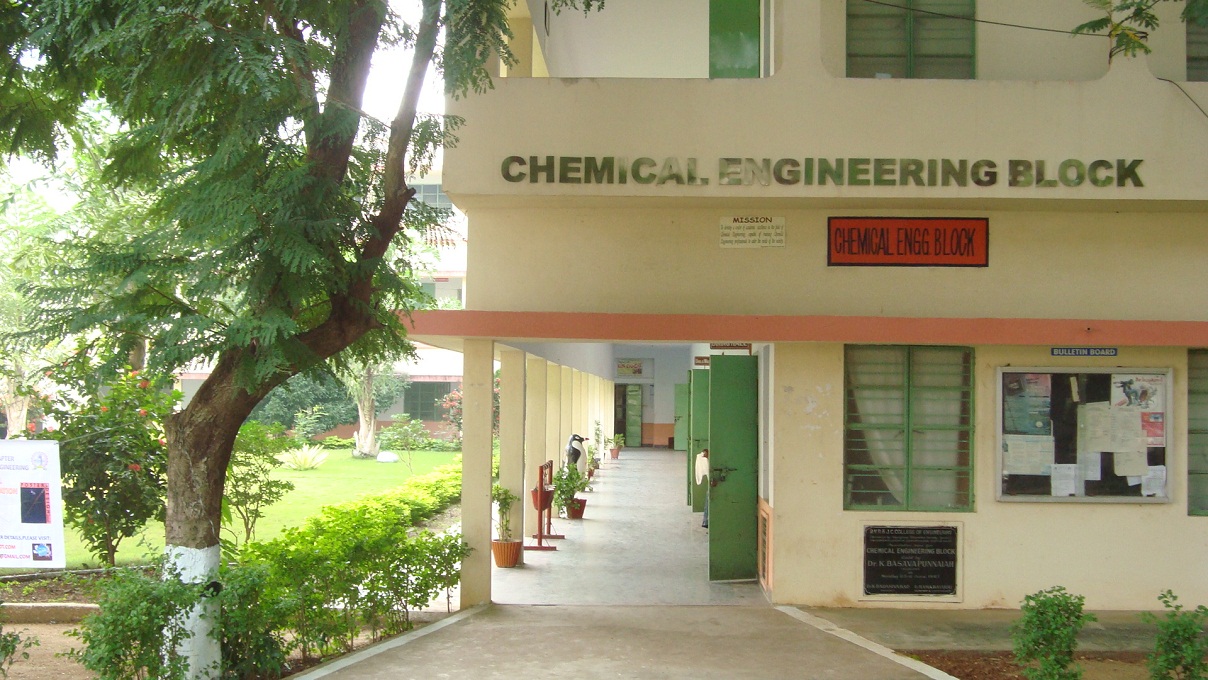Chemical Engineering
Vision
Mission
Programme Educational Objectives (PEOs)
At the end of the program, the student is enabled to:
- Acquire working knowledge of Applied Mathematics, Physics, Chemistry and basic Engineering Sciences that lay a strong foundation for understanding the core Chemical Engineering and allied specializations.
- Develop an understanding of principles related to the major domains of Chemical Engineering and ability to obtain data necessary to formulate and solve problems related to Chemical Engineering equipment/unit operations/unit processes with or without the use of relevant software.
- Integrate knowledge of core and allied courses to comprehend the multi-disciplinary nature of technological and organizational problems, and provide solutions alive to the needs of industry and society.
- Develop inter-personal & managerial skills, professional ethics & values, entrepreneurship & life-long learning at individual and/or organizational level.
Program Outcomes (POs)
Upon graduation, students of the program will:
- Engineering Knowledge: Apply the knowledge of mathematics, science, engineering fundamentals, and an engineering specialization to the solution of complex engineering problems.
- Problem analysis: Identify formulate, review research literature, and analyze complex engineering problems reaching substantiated conclusions using first principles of mathematics, natural sciences, and engineering sciences.
- Design/development of solutions: Design solutions for complex engineering problems and design system components or processes that meet the specified needs with appropriate consideration for the public health and safety, and the cultural, societal, and environmental considerations.
- Conduct Investigations of complex problems: Use research-based knowledge and research methods including design of experiments, analysis and interpretation of data, and synthesis of the information to provide valid conclusions.
- Modern tool usage: Create, select, and apply appropriate techniques, resources, and modern engineering and IT tools including predication and modeling to complex engineering activities with an understanding of the limitations.
- The engineer and society: Apply reasoning informed by the contextual knowledge to assess societal, health, safety, legal and cultural issues and the consequent responsibilities relevant to the professional engineering practice.
- Environment and sustainability: Understand the impact of the professional engineering solutions in societal and environmental contexts, and demonstrate the knowledge of, and need for sustainable development.
- Ethics: Apply ethical principles and commit to professional ethics and responsibilities and norms of the engineering practice.
- Individual and team work: Function effectively as an individual, and as a member or leader in diverse teams, and in multidisciplinary settings.
- Communication: Communicate effectively on complex engineering activities with the engineering community and with society at large, such as, being able to comprehend and write effective reports and design documentation, make effective presentations, and give and receive clear instructions.
- Project management and finance: Demonstrate knowledge and understanding of the engineering and management principles and apply these to one's own work, as a member and leader in a team, to manage projects and in multidisciplinary environments.
- Life-long learning: Recognize the need for, and have the preparation and ability to engage in independent and life-long learning in the broadest context of technological changes.
Program Specific Outcomes (PSOs)
The Chemical Engineering Graduate will be able to
- Synthesize a conceptual chemical process selecting operations, suitable equipment and conditions with proper control systems to produce products with required specifications.
- Analyze the economics of process design & modify the process with the aid of process simulation for identifying the potential environmental impacts & safety concerns.
Copyright © Department of ChE. All Rights Reserved
